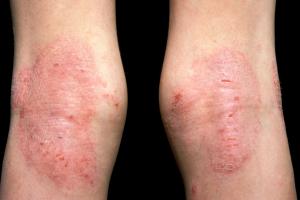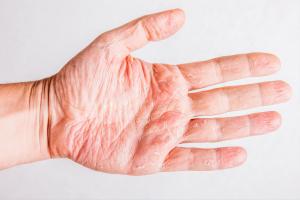Eczema (atopic)
Atopic (allergy related) eczema, also known as atopic dermatitis, is the most common form of eczema. It mainly affects children, but can also affect adults.
Symptoms of atopic eczema
Eczema is a condition that causes the skin to become itchy, red, dry and cracked. It is a long-term (chronic) condition in most people. However it can improve over time, especially in children.


Atopic eczema can affect any part of the body. The most common areas affected are:
- backs or fronts of the knees (usually at the front in babies)
- back or front of the skin crease at the bend of the elbows (usually at the back in babies)
- around the neck
- hands
- cheeks
- scalp (usually in babies)
Signs of an infection
Occasionally, areas of skin affected by atopic eczema can become infected. Signs of an infection can include:
- your eczema getting a lot worse
- fluid oozing from the skin
- a yellow crust on the skin surface or small yellowish-white spots appearing in the eczema
- the skin becoming swollen and sore
- a high temperature (fever) and generally feeling unwell
See your doctor as soon as possible if you think your or your child's skin may have become infected.
People with atopic eczema usually have periods when symptoms are less noticeable. There can also be times when symptoms become more severe (flare-ups).
Diagnosing atopic eczema
Your GP will usually be able to diagnose atopic eczema by looking at your skin and asking questions about your symptoms.
You should tell your GP if your condition is affecting your quality of life – for example, if you have difficulty sleeping because of itching, or your eczema limits your everyday activities.
Causes of atopic eczema
The exact cause of atopic eczema is unknown. However, it is thought that it's not down to one single thing. It often occurs in people who get allergies. The word "atopic" means sensitivity to allergens.
It is a combination of having an inherited tendency to it, and exposure to triggers in the environment that cause it to develop.
It can run in families. It can often develop alongside other conditions, such as asthma and hay fever.
The symptoms of atopic eczema often have certain triggers, such as soaps, detergents, stress and the weather. Sometimes food allergies can play a part, especially in young children with severe eczema.
Treating atopic eczema
There is currently no cure for atopic eczema. Treatment can help relieve the symptoms of atopic eczema. Many cases improve over time.
However, severe eczema often has a significant impact on daily life (see link below for more information). There is also an increased risk of skin infections.
Many different treatments can be used to control symptoms and manage eczema, including:
- self care techniques, such as reducing scratching and avoiding triggers
- emollients (moisturising treatments) – used on a daily basis for dry skin
- topical corticosteroids – used to reduce swelling, redness and itching during flare-ups
Who is affected
About one in five children has atopic eczema. In eight out of 10 cases, atopic eczema develops before a child reaches the age of five. Many children develop it before their first birthday.
Atopic eczema can improve significantly, or even clear completely, in some children as they get older. About half of all cases improve a lot by the time a child reaches 11 years old, and around two-thirds improve by the age of 16.
However, the condition can continue into adulthood. It can sometimes develop for the first time in adults.
Other types of eczema
Eczema is the name for a group of skin conditions that cause dry, irritated skin. Other types of eczema include:
- discoid eczema – a type of eczema that occurs in circular or oval patches on the skin
- contact dermatitis – a type of eczema that occurs when the body comes into contact with a particular substance
- varicose eczema – a type of eczema that most often affects the lower legs and is caused by problems with the flow of blood through the leg veins
- seborrhoeic eczema – a type of eczema where red, scaly patches develop on the sides of the nose, eyebrows, ears and scalp
- dyshidrotic eczema (pompholyx) – a type of eczema that causes tiny blisters to erupt across the palms of the hands
More useful links
The information on this page has been adapted from original content from the NHS website.
For further information see terms and conditions.